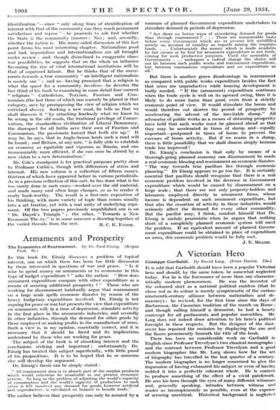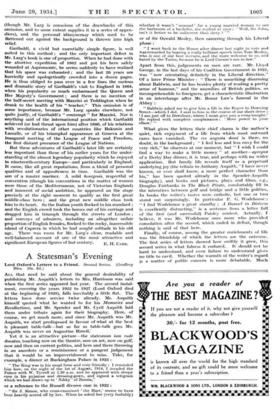A Victorian Hero
Giuseppe Garibaldi. By David Larg. (Peter Davies. 15s.) IT is odd that Garibaldi should have been a popular Victorian hero and should, by the same token, be somewhat neglected today. For he is the forerunner of more than one character- istically modern phenomenon. He was the inventor of the coloured shirt as a national political emblem (that he chose red as its colour is merely symptomatic of the curious nineteenth-century alliance between nationalism and de- mocracy) ; he revived, for the first time since the days of Barbarossa, the Caesarian tradition of the march on Rome ; and though calling himself a democrat, he had a hearty contempt for all parliaments and popular assemblies. Mr. Larg does not indeed draw attention to his hero's political foresight in these respects. But the designer of the dust- cover has repaired the omission by displaying the axe and the fasces prominently beneath the title of the book.
There has been no considerable work on Garibaldi in English since Professor Trevelyan's two classical monographs ; and the contrast between Professor Trevelyan and a good modern biographer like Mr. Larg shows how far the art of biography has travelled in the last quarter of a century. The modern biographer is no longer concerned to give the impression of having exhausted his subject or even of having welded it into a perfectly coherent whole. He is content to produce something of the effect of a vivid patchwork. He sees his hero through the eyes of many different witnesses and, generally speaking, intrudes between witness and reader as inconspicuously as possible, even at the expense of seeming uncritical. Historical background is neglected (though Mr. Larg is conscious of the drawbacks of this omission, and to some extent supplies it in a series of appen- dices), and the personal idiosyncrasy which used to be flattened out against the background is thrown into high relief.
Garibaldi, a vivid but essentially simple figure, is well suited to this method ; and the only important defect in Mr. Larg's book is one of proportion. When he had done with the abortive expedition of 1862 and got his hero safely wounded at Aspromonte, he seems suddenly to have realized that his space was exhausted ; and the last 20 years are hurriedly and apologetically crowded into a dozen pages. He is thus obliged to pass over in a few lines the curious and dramatic story of Garibaldi's visit to England in 1864, when his popularity so much embarrassed the Queen and Her Majesty's Government ; and there is no mention of the half-secret meeting with Mazzini at Teddington when he drank to the health of his " teacher." This omission is of some importance, because Mr. Larg speaks elsewhere, not quite justly, of Garibakli's " contempt " for Mazzini. Nor is anything said of the international position which Garibaldi achieved (or had thrust upon him) after 1860, of his relations with revolutionaries of other countries like Bakunin and Lassalle, or of his triumphal appearance at Geneva at the inaugural meeting of the League of Peace and Freedom, the first distant precursor of the League of Nations.
But these adventures of Garibaldi's later life are certainly less important than those of his earlier years for the under- standing of the almost legendary popularity which he enjoyed in nineteenth-century Europe—and particularly in England. It came, like all great reputations, from a blend of personal qualities and of appositeness in time. Garibaldi was the son of a master mariner. A solid bourgeois, respectful of convention (though his conventions in the matter of women were those of the Mediterranean, not of Victorian England) and innocent of social ambition, he appeared on the stage precisely at the right moment to qualify as the first great middle-class hero ; and the great new middle class took him to its heart. So the Italian youth flocked to his standard ; and the English crowd took the horses out of his carriage and dragged him in triumph through the streets of London ; and convoys of admirers, including an altogether unfair proportion of English females, flocked to the rocky, inaccessible island of Caprera in which he had sought solitude in his old age. There was room for Mr. Larg's clear, readable and well-balanced account of one of the most attractive and significant European figures of last century. E. H. CARE.





































 Previous page
Previous page